
Don’t ask us for sources, but we have a general recollection of people arguing in defense of Mother Gothel’s actions in Tangled by invoking the “it’s not fair that they took that flower and boiled it just to save a monarch” argument. We thought it might be immense fun to use that as a jumping off point to talk about all of the ethical issues of the Sun’s Gift in Tangled that we could think of. Yeeeeey.
1. Who is worth boiling a magical flower for?
The movie doesn’t tell us much, but what we have is that the Queen is beloved by her people, and that they all, citizens and guards alike, went out looking for this legendary healing flower in hopes of saving her. We also see them dig the flower up carefully, so their initial intent wasn’t to just kill it. It seems implied that they could have saved her using the song that Gothel (for reasons unknown) knows how to use, but because she was hoarding the flower for herself their only option was to make Sun’s Gift tea.
The bonus material on our DVD shows the first storybook opening of the movie being a lot closer to Rapunzel the fairy tale, where a man goes three times to the witch next door asking for her greens for his pregnant wife, which she denies. Finally he just steals them, and the witch severely overreacts and steals the child as punishment. In the Tangled version it wasn’t just lettuce, but the flower. It would be a lot more complicated if they’d kept it like this, because while we would be able to understand the King’s desperation to save his wife and we would likely feel that Gothel was being a bit ridiculous by not just singing the song for the Queen, we would still be able to see it from Gothel’s point of view.
The final version of the story’s opening clearly depicts this flower as just a gift in general, not Gothel’s property, not on Gothel’s land, and why she wouldn’t just alert the kingdom to its presence so that it could be protected and used for things besides her own personal fountain of youth helpfully adds to our villain’s demonstrable selfishness.
In any case, stealing the child and manipulating her into staying in a tower forever is not justifiable. Sorry.
Now let’s talk about that monarchy thing. Disney gets a lot of flack for being Princess-saturated because monarchism is problematic, to say the least. We think this is unfair because Disney Princessdom is reserved not only for bona fide princesses (otherwise Kida and Eilonwy would be in that lineup) but for strong heroines like Mulan and Pocahontas (Pocahontas may count as a bona fide princess – it’s a “your mileage may vary” thing. But Mulan isn’t one). We’d argue that the abundance of princesses in the Disney canon isn’t about endorsing the monarchy but rather metaphorically exploring female empowerment. Sometimes. OK maybe that’s a bit of a stretch, but we can talk about that some other day.
The point for now is, who is worth sacrificing this flower for? Remember that Tangled is perfectly happy to talk about sacrifice – we have a lot of that going on in the third act. Rapunzel tells Gothel that she will go with her, willingly, as long as she’s allowed to heal Eugene, and Eugene tries to talk her out of it and finally just cuts her hair, choosing death rather than allowing her to be exploited forever. Because of this heaviness in the third act we don’t think it’s reaching to suggest that the sacrifice of the flower in the opening is a little more thought out than just, “Well, obviously you do whatever to save the Queen.” It’s more about understanding that sometimes you have to sacrifice things – important things, things others might not be prepared to or willing to or in favour of sacrificing – because life is complicated but you should still try to be good, and try to do right by the people you care about. See also Frozen. And Princess and the Frog. And Big Hero 6. And Wreck-It Ralph. Zootopia has a different message. But Moana will maybe continue this theme.
If the story hadn’t flipped around which man gets to be common and a thief from Rapunzel’s father to Rapunzel’s love interest, we’d probably be a lot more comfortable with the tea-making. It’s a commoner who is dying, and her husband does something a little bit wrong to save her. We could probably swallow that pill a little more easily. It’s because she’s a queen and the power dynamic is so obviously there that we question ruining this flower forever – which is obviously not what happened but they didn’t know that the baby would be the new vessel for the Sun’s Gift. Hold that thought for one more paragraph.
The flip-side of the monarch problem is that the way that monarchy works, the best interests of the monarchs are often the best interests of the people as well. If the pregnant Queen was allowed to die, the King would be left without an heir. This is a temporary problem, we suppose, but it would leave the kingdom unstable – if this wasn’t a Disney movie. The point is, we are shown that the people are concerned about their Queen and will go to reasonable extremes to save her. We don’t have qualms about it… but we do get where Gothel’s defenders are coming from as far as the monarchy thing goes. Sort of.
2. What would have happened if Gothel had just moved on?
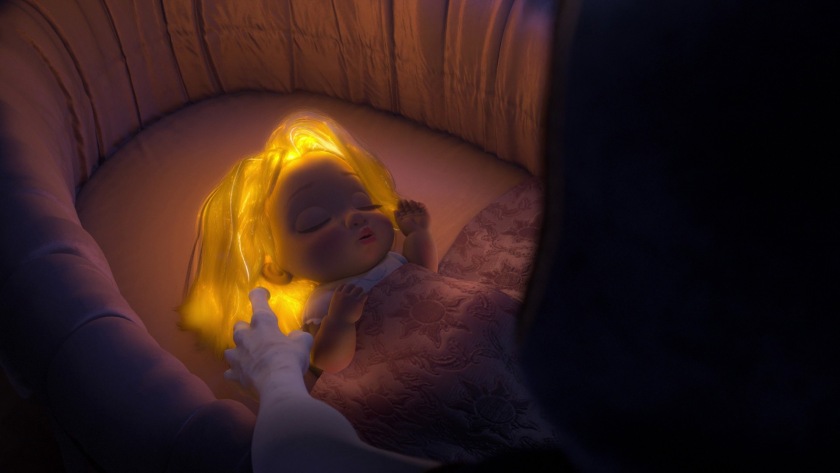
Rapunzel’s first haircut would have been interesting. And while her tears are also magical, we’re pretty sure that song is still necessary, so Rapunzel would live her entire life without realizing that she had powers, and would never have been in danger of being exploited by selfish people.
3. This movie is the smartest super hero movie ever, isn’t it?
Why yes, yes it is! The sun randomly decided to gift the world with healing powers (or was it by accident?) and at first, it was embodied in a non-sentient living creature, but then became a part of a human girl. The villain sees Rapunzel as her key to eternal youth which very inconveniently sprouted a willpower of its own. How annoying would that be?
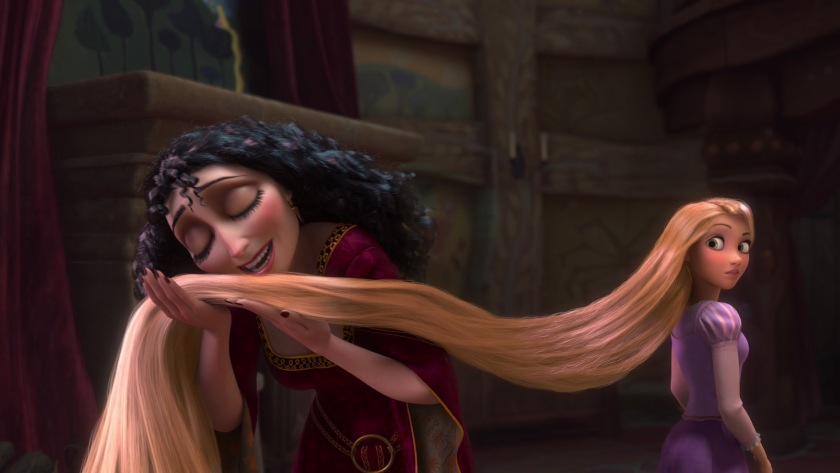
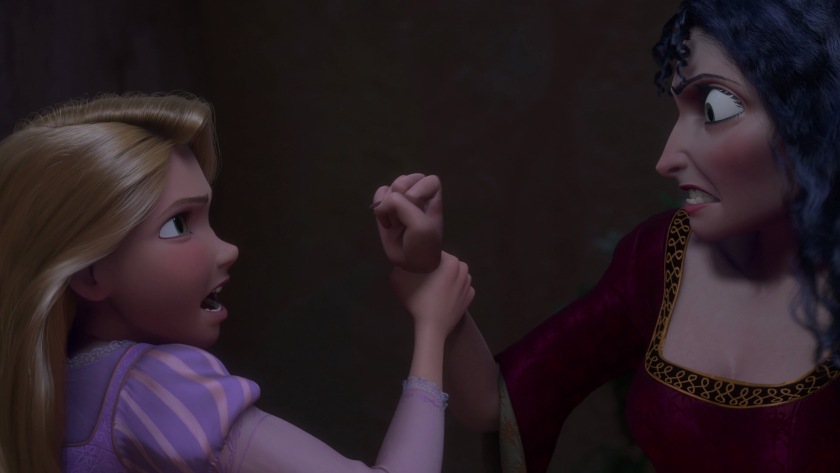
Rapunzel knows that Gothel is using her to stay young but is happy to oblige, because she loves her. But she’s also been told since she was young enough to want to go outside that she is in danger of being exploited by cruel, selfish people, so when she learns that she is the lost princess the realization that Gothel is actually the person she has always been warned about comes fast. She vows to never let Gothel use her hair again.
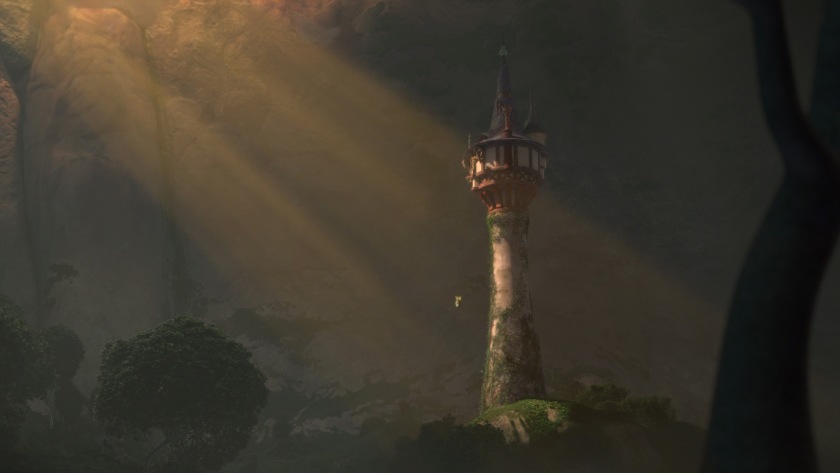
The metamorphosis of the Sun’s Gift into a thinking, feeling creature who can decide for herself when to use the powers might be a comment on… human progress? Maybe? The movie emphasizes Rapunzel’s kindness and wisdom. Eugene tells us at the end that she became a good and beloved leader like her parents, and the entire movie is about Rapunzel’s never-ending optimism winning against others’ entrenched cynicism (WHICH WE LOVE BY THE WAY. WE LOVE IT SO MUCH WE HAD TO TELL YOU IN ALL CAPS). Giving her say over what the Sun’s Gift is used for and effectively taking it from Gothel is an endorsement of human decency over cynicism and relentless individualism. The power becomes something used due to empathy rather than selfishness.
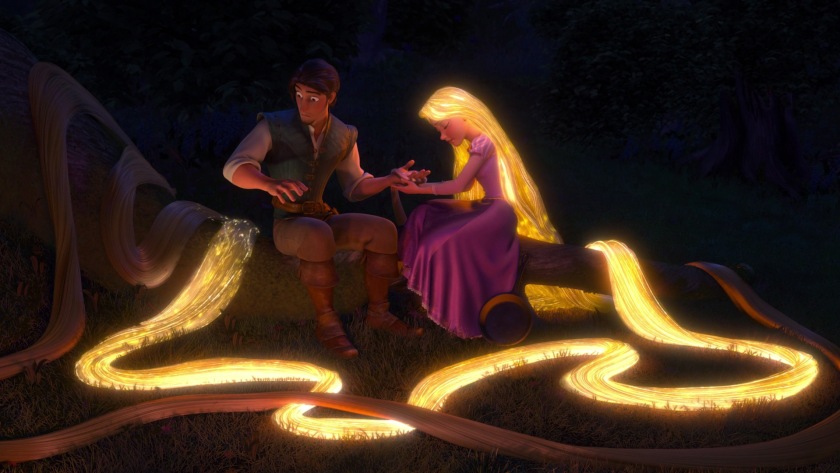
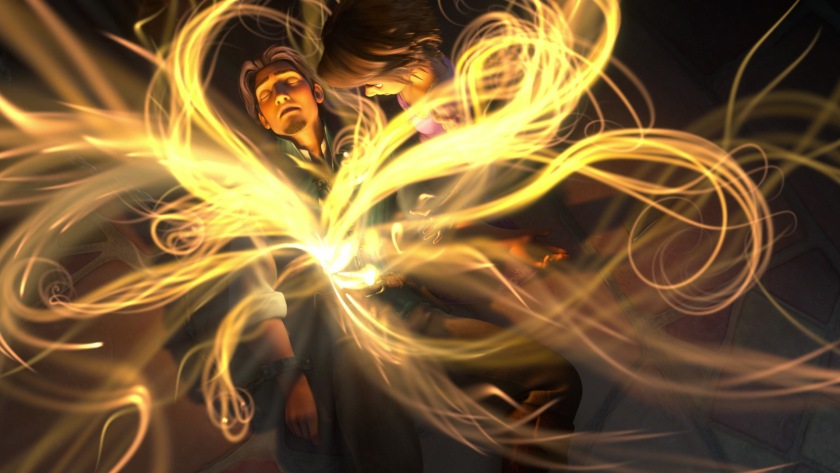
4. OK we talked about the flower power forever, so now: what is up with petty thieves being hanged?
We came up with three possible explanations. One: the King and Queen are so good that there is basically no crime except the occasional theft, so when it happens they are very upset by it and it means a lot more to them than it would to us. Makes perfect sense, right?
Two: Gothel somehow orchestrated his hanging. Why else would she know for sure that Eugene would be hanged for his crimes when she tells Rapunzel that’s what’s happening? So this is the one that makes the most sense, until you hear our third.
Three: Maximus is so severe that he decreed that every criminal gets executed. But then learning that Eugene is not a bad guy softens his gigantic horse heart, and the kingdom becomes much kinder to criminals, even allowing them to be guests at royal weddings as we see with the Stabbington twins in Tangled Ever After. Because obviously Maximus is the one who gets to make all of the important decisions. We’d be OK with that.
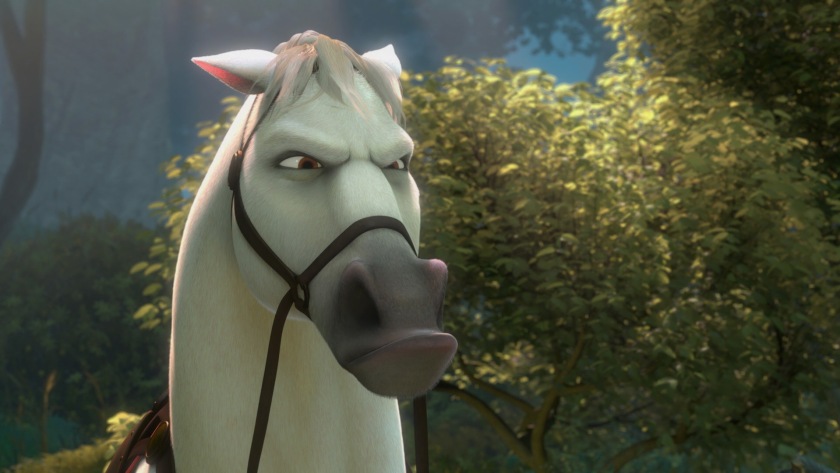
All caps from Disney Screencaps, per the norm.













[…] laziness has infected us, so we’ll only refute a couple. Though we have already done this a […]
[…] I Want: Our Guide to Disney Princesses, In Defence of Mr and Mrs Arendelle, Beauty and the Beast, The Ethics of the Sun’s Gift, and because I wouldn’t feel right talking about erm and three and not mentioning felines, […]